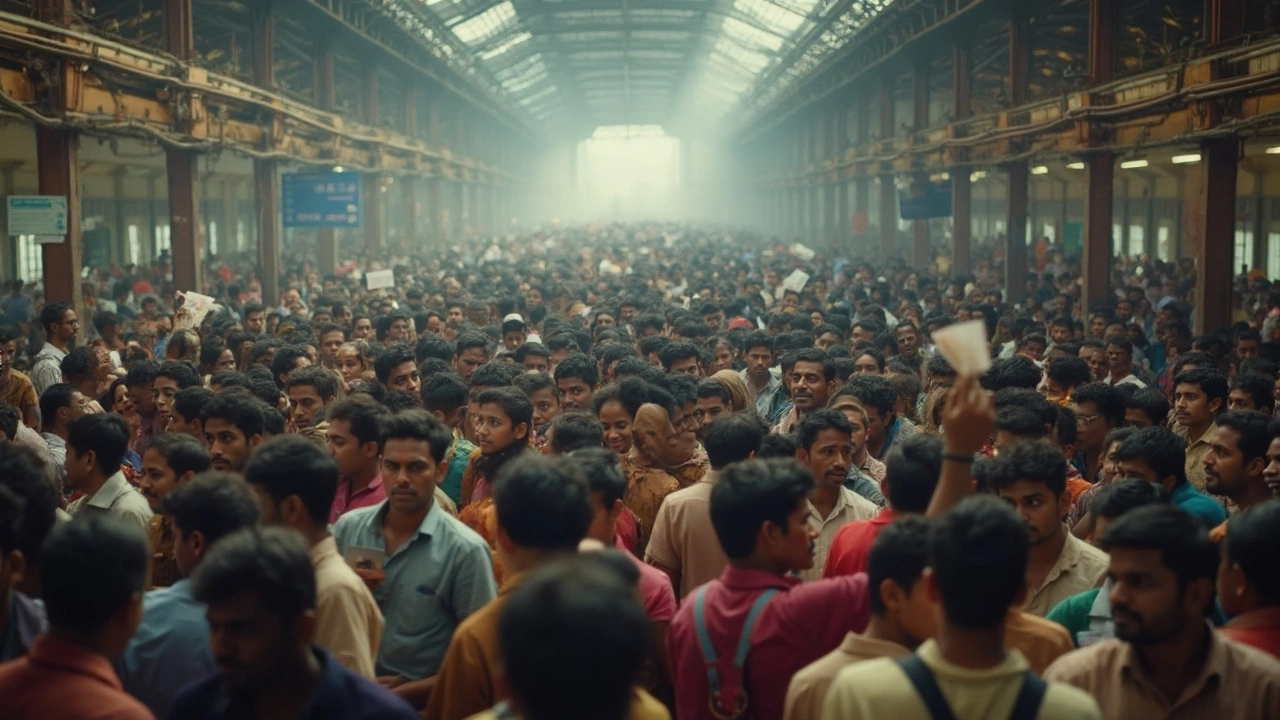Ever wondered if snagging a government job is actually realistic, or if it's just a distant dream everyone chases? Here's the plain truth: every year, over two crore people apply for government jobs in India, but only a tiny fraction land one. In some big-name exams like SSC CGL or UPSC, your chance of selection is less than 1%. Astounding, right?
Don’t let that number make you panic. The harsh competition is real, but most candidates stumble long before the finish line. Many sign up because their family expects it, or just to 'give it a try'—but haven’t prepared smartly. That’s where your edge can come in. If you really know how the process works and prep in the right way, you’re already ahead of most people who apply.
This isn’t about memorizing random facts or studying for years. What matters is knowing exactly what gets asked, how to manage your time, and being honest about your weak spots. Even something as simple as practicing old papers, or building your reading habit, can change the game. Want the odds on your side? Let’s dig into what actually works and what you need to watch out for.
- Understanding the Numbers: Chances and Application Stats
- What Makes Government Job Exams So Competitive?
- Breaking Down the Selection Process
- Smart Prep Strategies That Actually Work
- Your Next Best Moves: Practical Tips and Mindset
Understanding the Numbers: Chances and Application Stats
If you’ve ever felt like everyone you know is prepping for a government job, you’re not imagining things. According to the Department of Personnel and Training, for every 10,000 government jobs announced across India in a typical year, sometimes more than one crore applications flood in. The 2023 SSC CGL exam had about 25 lakh applicants, fighting for just around 7,500 positions. Simple math says less than 0.3% make the cut. For the UPSC Civil Services Exam, it’s even tighter—over 12 lakh sign up, but only around 700 get through to the final stage each year.
What about state-level jobs? No huge relief there. State PSCs like UPPSC, MPSC, and BPSC also get lakhs of entries for a few thousand openings. Even clerical roles at the entry level—like RRB Group D—saw more than 1.15 crore people apply for less than 1 lakh seats in the last round. That means, sometimes, more than a hundred people fight for one single job.
The trend isn’t because there are fewer jobs now. It’s more about everyone craving job security, steady income, and government perks. Plus, the slowdown in private sector hiring pushes even more people to take a shot here.
So, what actually happens on the ground?
- Many people apply but never show up for the exam. In SSC CGL 2023, almost 35% of applicants skipped the test!
- Around half of those who do show up aren’t really prepared—they just want to try for the experience.
- If you treat the process seriously, your practical chances get a little bit better than the raw stats suggest.
Bottom line is, the odds look brutal on paper, but a huge chunk of the competition isn’t fully in the race. If you’re actually putting in honest prep, you’re up against a smaller, more focused crowd.
What Makes Government Job Exams So Competitive?
Ask anyone who’s tried for a government job—it’s cutthroat. There are a few solid reasons why these exams feel tougher than most college entrances or private sector interviews.
- Huge number of applicants, limited seats. Sometimes, a single job posting can see lakhs of applications. For example, in 2024, the SSC CGL exam had around 35 lakh applicants for less than 8,000 posts. It’s kind of like a stadium full of people fighting for just a handful of tickets.
- The perks sound too good to ignore. Good salary (often with regular hikes), job security, fixed work hours, and a solid pension at the end—who’d want to miss out? This drives both freshers and experienced folks to keep trying year after year.
- No strong barriers. For most entry-level jobs, just a bachelor’s degree is enough. This makes the pool of possible candidates massive, especially across big states like Uttar Pradesh, Bihar, and West Bengal.
- Prepping isn’t cheap or easy. Coaching centers charge five-figure fees for crash courses or full-year bundles, so people who can’t afford it have to figure out their own path, which adds to the pressure.
Check out the kind of numbers you’re up against:
| Exam | Applicants | Posts Available | Selection Ratio |
|---|---|---|---|
| SSC CGL 2024 | 35,00,000 | 7,800 | ~0.22% |
| UPSC Civil Services 2024 | 13,00,000 | 1,056 | ~0.08% |
| IBPS PO 2024 | 9,00,000 | 3,049 | ~0.34% |
The government jobs craze isn’t just about the paycheck. It’s also about status. These jobs hold a certain respect in society—parents want their kids to land them, and neighbours gossip about who did and didn’t make it. That’s why even after multiple failures, many give it another shot, making competition more intense every year.
With so many candidates taking coaching, practicing daily, or even quitting jobs to focus solely on prep, there’s no such thing as an 'average' exam taker anymore. To have a real shot, you need to understand exactly what you’re up against—huge crowds, high stakes, and serious competition.

Breaking Down the Selection Process
So, what's actually standing between you and that government job? It's not just filling out a form and hoping for the best. Government job exams in India work with a multi-step elimination game, and every round is designed to filter out more applicants.
Here’s how most major recruitments go down:
- Online Application: First, you apply online. Sounds easy, but miss a detail or deadline, and you’re out before you even begin.
- Screening/Preliminary Exam: This is usually an objective, computer-based test. It checks general awareness, language skills, and reasoning. For exams like SSC CGL, lakhs of students show up, but only the top 5-10% move forward.
- Main Exam: Get through prelims, and you hit the mains. These tests go deeper. For banking jobs, expect puzzles, English, data analysis, and sometimes a descriptive test. Here, the cut-offs are brutal—you need more than just passing marks.
- Skill/Typing Test or Physical Test: For certain roles (like clerks or police jobs), you might need to show you can actually type at speed or pass physical standards. Miss the mark, and there’s no second shot.
- Interview/Personality Test: Not every job has it, but for high-level posts (think UPSC), the final round is an interview with a panel. They check your confidence, logical thinking, and sometimes, how you cope under pressure.
- Document Verification & Medical: Even after everything, you need all your grades and certificates in order. Don’t have the correct documents? You’re done. And yes, some jobs want a full medical check before appointment.
Here’s a quick look at how the process shakes out for two popular government jobs:
| Exam Name | Applicants | Final Vacancies | Selection Ratio |
|---|---|---|---|
| SSC CGL 2023 | 25 lakh+ | 35,000 | ~1.4% |
| UPSC Civil Services 2023 | 11 lakh+ | 1105 | 0.1% |
So, when someone says the government jobs selection process is tough—they aren't kidding. Every tick box, every test, every round counts. That’s why you can’t afford to treat any stage lightly, no matter how small or easy it looks. Missing one piece, and you’re out for the year.
Smart Prep Strategies That Actually Work
The brutal truth is: memorizing textbooks isn’t enough to grab a government job. The smartest candidates don’t just put in the hours—they use the hours wisely. Let’s break down real strategies that give you an edge, even when lakhs are competing for just a handful of seats.
First, know the exact pattern. Every major government exam—SSC, Banking, Railways, UPSC—has a set pattern for the syllabus and questions. If you don't know what to expect, you waste time on stuff that won't even show up. Regularly check the official notifications and past year papers. Before starting any deep study, spend an hour just understanding what actually gets asked.
Here’s where toppers never mess up: they mix smart practice with timing drills. Try this routine for any big test:
- Daily mock tests: Even just 2-3 papers a week can massively boost your speed and accuracy.
- Analyse mistakes: Each wrong answer tells you what to fix. Make a basic spreadsheet or grab a notebook to keep track.
- Revision cycles: Leave weekends for revising only what you got wrong during the week. No new topics.
A shocking fact? In SBI PO 2024, almost 85% of serious candidates said that regular mock tests were the game-changer for their selection, according to Oliveboard’s yearly survey.
“Practicing old question papers doesn’t just improve your speed, it actually tells you how the examiners think. Ignore this and you’re just gambling,” says Abhishek Jain, top rank holder, SSC CGL 2022.
Don’t skip the basics: GK and current affairs. For most jobs, nearly 20–25% of questions are current events or simple GK. Ten minutes a day reading a trusted news summary or monthly magazine (like Pratiyogita Darpan or The Hindu roundup) adds up.
Here’s a look at how many hours toppers spend per week, according to a recent Byju’s survey (2024):
| Exam Name | Average Weekly Study Hours | Recommended Mock Tests |
|---|---|---|
| SSC CGL | 30-35 | 2-3 |
| IBPS PO | 25-30 | 3-4 |
| UPSC Prelims | 40+ | 1-2 |
No fancy shortcuts. Instead, keep your prep practical, stay close to what gets asked, and measure your progress each week. That’s where most give up—and where you can stand out.

Your Next Best Moves: Practical Tips and Mindset
Let’s get down to what actually moves the needle if you want a real shot at a government job. Thinking you’ll pass by just hustling at the last minute or following random YouTube advice won’t cut it. Here’s what works, straight from people who’ve cracked the code and experts who see the same patterns every year.
| Tip | Why It Works |
|---|---|
| Daily timed mock tests | Puts you under real exam pressure, gets you used to time crunch and question styles. |
| Revision over new study material | Revisiting what you’ve learned cements memory. Don’t get distracted by too many sources. |
| Clear exam-wise strategy | Each exam (like SSC, UPSC, State PSC) has its own pattern; know what’s needed and ignore the rest. |
| Sleep and health in check | Lack of sleep tanks your focus and memory. Take breaks—your brain isn’t a robot. |
| Peer groups or accountability partners | Having someone to discuss doubts and boost morale really helps on rough days. |
Now, about mindset: You need grit, but also flexibility. If you bomb a mock test or miss a day, don’t spiral. One bad week doesn’t define your journey. Most successful candidates faced lots of small failures before they got in.
"The path to any government job is less about brilliance and more about keeping at it, even when boredom or rejection sets in. That’s what gets people hired," says Anurag Pathak, founder of StudyIQ.
Keep your eyes on your real competition—not the two crore who apply, but the few thousand who actually go all the way. Cut distractions: uninstall those apps, put your phone in another room, whatever works for you. If you’re stuck, ask for help from toppers or teachers (DMs work, seriously).
- Track your progress every week, not every day. Trends matter more than small ups and downs.
- Set realistic phase goals: Before getting perfect marks, just try completing each mock within the time.
- If you aren’t seeing improvement after two or three months, change your study method. Don’t be afraid to switch things up.
If you ever feel like quitting, remind yourself: even among those who prepare seriously, the ones who last till the end are much fewer. Be stubborn about your goal and flexible in your approach. That’s how you beat the odds.
